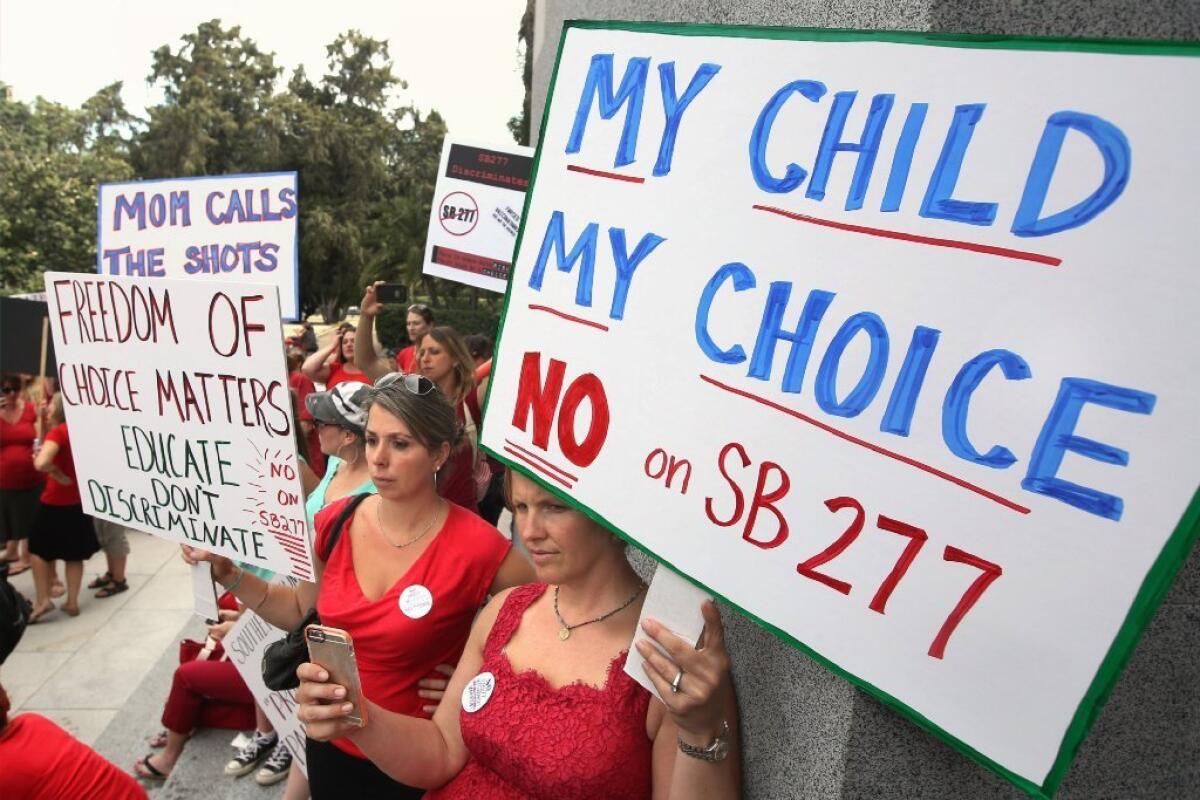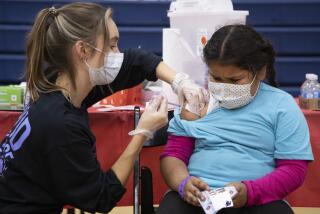Opinion: Will science rule in Jerry Brownâs decision on California vaccine bill?

Parents rally in Sacramento on Monday against legislation that would bolster Californiaâs vaccination requirements.
Gov. Jerry Brown has been among the worldâs leaders when it comes to recognizing and responding to the science of climate change. Now the question is whether heâll do the same with what science says about vaccinations.
The California Legislature has done its part by locking arms against a host of misinformed anti-vaccination hype, hewing to the science on a controversial issue and, most important, acting to protect the public. Last week, in a bipartisan vote, the Assembly easily passed this yearâs hot-button bill to require childhood inoculations for all schoolchildren except those with valid medical reasons for avoiding them. On Monday, the Senate approved a few amendments in the legislation and sent it on to the governor.
Immunization rates have fallen too low for safety in many areas of the state -- lower than 75% in some spots. The level needed to protect all children ranges from 90% to 95%, depending on the vaccination. To repeat, despite the objections of many parents and Assemblyman Mike Gatto (D-Glendale), the right of parents to make medical decisions for their children has to give way when those decisions endanger other people. Some children have well-established medical conditions -- generally, a compromised immune system -- that preclude vaccination. And in a small percentage of children, the vaccine doesnât provide the needed immunity. These two groups of children -- and younger siblings who are too young to have received their inoculations -- are protected by the health of those around them.
For too long, non-vaccinating parents have been getting a free ride off the rest who do the responsible thing; they then use the low rates of illness to claim that immunization obviously isnât necessary. It didnât take long for that argument to start showing holes, when cases of measles broke out last winter in a state that had eliminated the disease.
Or, as Assemblywoman Catharine Baker (R-Sam Ramon) put it: âIâm a fierce supporter of parent choice in this decision. But I also believe that with choice comes personal responsibility.â
The anti-vaccine arguments have included some strange assertions, such as the existence of a âsecretâ federal board to pay damages to children harmed by vaccines, and the idea that we donât need vaccines because killer diseases such as polio have ârun their course.â Outbreaks run their course much of the time -- often leaving death and tremendous suffering in their wake. Diseases, on the other hand, donât just go away. Polio was afflicting thousands of people in India every year until an effective vaccination campaign brought the number of wild polio cases down to zero earlier this decade.
Meanwhile, the compensation board is not some kind of conspiracy; its existence is well-established. No one ever said vaccinations were totally without risk, just that serious complications are extremely rare. There is a far lower chance of serious complications from immunization than from, say, measles, despite the vaccine opponents who contend that measles is just a mild childhood disease.
If anything, the bill is a little on the soft side. Parents who prefer to spread vaccinations out over a longer period would have some opportunity to do that; under the bill, schools can work with parents on completing the job while still enrolling their children. And medical excuses are fairly easy to obtain under the billâs provisions, perhaps too easy.
Yet Brown has not taken a position on the bill and its fate on his desk is uncertain. He signed previous legislation to restrict parentsâ use of the personal-belief exemption. They now have to get a form signed by a health practitioner, saying that they have been informed about the benefits and risks of vaccination. But Brown also unilaterally amended the law to exempt parents from it who state that vaccination is against their religious beliefs.
The new bill would eliminate both exemptions. And it ought to pass. Despite Gattoâs conjecture that SB 277 is probably unconstitutional, a similar law in Mississippi, in effect since the 1970s, has withstood court scrutiny. And this state is in the minority nationwide with its personal belief exemption. Other states have been far more progressive about protecting against easily preventable diseases. If Brown brings the same science-based thinking and commitment to public well-being that he applies to the issue of climate change, California might just get there as well.
Follow the Opinion section on Twitter: @latimesopinion
More to Read
A cure for the common opinion
Get thought-provoking perspectives with our weekly newsletter.
You may occasionally receive promotional content from the Los Angeles Times.











